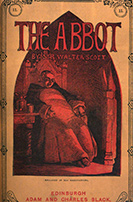The Abbot
“The former tenant of our house, a priest, had died in the back drawing-room. Air, musty from having been long enclosed, hung in all the rooms, and the waste room behind the kitchen was littered with old useless papers. Among these I found a few paper-covered books, the pages of which were curled and damp: The Abbot, by Walter Scott, The Devout Communicant and The Memoirs of Vidocq. I liked the last best because its leaves were yellow.”
-“Araby” (D 29)
Joyce understood the value of books and regarded both their linguistic and monetary worth. Always short of funds, the young Joyce once tried to turn a profit in the trade in Walter Scott books. The story begins with a pawn ticket from a medical student for some books held at Terence Kelly’s shop in Fleet Street. Joyce believed these volumes to be expensive medical texts that could easily be resold at a profit. Joyce convinced Padraic Colum to help put up the seven shillings necessary to get the books out of hock and take them to George Webb’s bookshop. However, once they retrieved the books, the two discovered the texts to be an inexpensive set of the Waverley Novels with one volume missing. After inspecting the Scott volumes, Webb advised the young men to pawn them once more. Joyce returned the novels to Kelly for six shillings, losing a shilling for their trouble (JJ 141). Around this same time, Joyce was writing Araby, and one would like to think that the lone copy of The Abbot found in the waste room on North Richmond Street was the one missing volume from the pawned set of books. Of course, there is no evidence to support such a claim, but the connection between the fictional volume and the circulation of Scott’s novels in Joyce’s Dublin reveals the complex ways in which people came into contact with literary works during this period.
The edition included here is a cheap reprint with paper covers that fits the description given in “Araby.” Scott was one of the best selling authors throughout the nineteenth century, and as the book buying public shifted throughout the century a wide range of editions entered the market to meet the demand.

